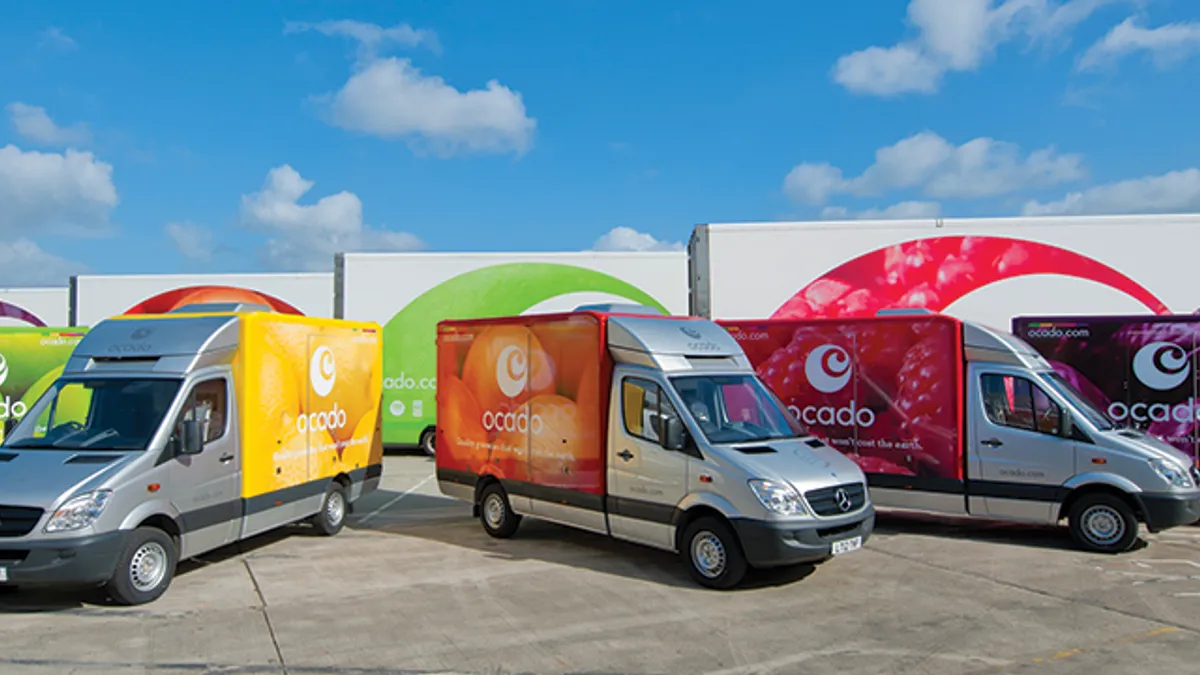Dive Brief:
- Ocado, the British e-grocer that last year forged a fulfillment partnership with Kroger, will begin testing a new one-hour delivery service called Zoom in London next month. The company, which focuses on large orders delivered from its massive automated warehouses, aims to make the service available to retailers licensing its technology, including Kroger.
- The program will run out of an automated micro-fulfillment center that stocks around 10,000 products and is supplied by Ocado's larger warehouses. Zoom will target small and medium-sized orders and carry a larger fee than its standard service.
- Separately, an Ocado fulfillment center in southern England sustained significant damage following a fire that broke out early Tuesday. The 240,000-square-foot facility processed around 30,000 orders weekly and accounted for 10% of the company's capacity in England. The cause of the fire is unknown at this point.
Dive Insight:
Zoom could provide an important missing link for Kroger's e-commerce future. Ocado's large warehouses, like the one currently under construction just outside Cincinnati, fill large orders at a low cost. But the system is geared toward the stock-up shop, which many Americans are moving away from. The orders also take hours to fill and ship, which is too slow for the many shoppers that want delivery on-demand — particularly shoppers in population-dense areas where the economics of delivery are most favorable.
According to consulting firm Capgemini, just 19% of grocers globally offer two-hour delivery, but 55% of consumers say having this feature would increase their loyalty towards a retailer.
Whole Foods, notably, offers free two-hour delivery to Amazon Prime members in 60 markets nationwide. That expansion is no doubt weighing on Kroger, which has significant overlap with Whole Foods stores. According to data sent to Grocery Dive from Wolfe Research, 31.6% of Kroger stores are located within at least five miles of a Whole Foods store; just under 5% have one that's a mile or less away.
Kroger currently offers on-demand delivery through third-party companies like Instacart, but with many competitors also offering this option and with Kroger betting much of its future on e-commerce, the grocer is under pressure to separate from the herd.
Cost will be a factor, with Kroger having to pay an additional fee for each micro-fulfillment center Ocado builds. If the retailer builds one, possibly two, small fulfillment centers to accompany each of the 20 large-scale facilities it's building in concert with Ocado, those dollars will add up quickly.
In an earnings call this week, Ocado CEO Tim Steiner said the Zoom facilities won't add significant ongoing cost to retailers.
"We can run the warehousing, the micro-fulfillment center, and most critically, the supply chain into the micro-fulfillment center for not significantly more than we can run the large facility," he said.
Another question mark for Kroger is time. The grocer and Ocado have broken ground on the first U.S. fulfillment center, but each facility requires two years from announcement to opening, which means it won't open until late next year at the earliest. And with Ocado still needing to put Zoom through its paces, it's not clear when the on-demand solution would show up stateside for Kroger.
Meanwhile, other grocers are piloting their own micro-fulfillment solutions, including Albertsons and Stop & Shop. On the East Coast, Ahold Delhaize is building scaled-down fulfillment solutions through Peapod, including an e-commerce hub and warerooms attached to its banner stores.
Fulfillment innovations promise to speed up delivery while also bringing down prices. With its Ocado deal, Kroger has a potential game-changer that could deliver a range of order sizes at variable speeds. The question is, will it arrive fast enough?













